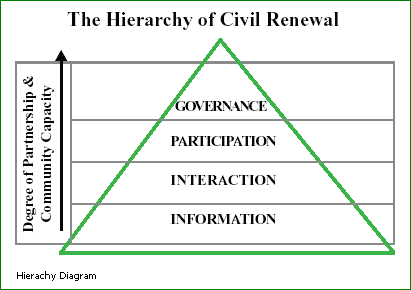The UK Experience by Malcolm Morley *
Civil Renewal is about local people being active in the protection and improvement of the quality of life in their local communities. It is also about organisations that can have an impact on the quality of life in communities, being actively engaged with those communities to ensure that the potential to protect and improve the quality of life is realised in practice.
Civil Renewal is not a concept that can be delivered by imposition by organisations. It requires the willingness and ability of individuals, communities and organisations to engage in a true partnership based upon a clear, shared vision of what is to be achieved in a community.
Different stakeholders often have differing perceptions of needs and priorities. This creates complexity and means that any approach to Civil Renewal has to be flexible and led locally. It also means that the key to Civil Renewal is the willingness and ability of stakeholders to work with one another and to allow objectives, priorities and resource allocations to reflect local needs.
The process for the development of stakeholder willingness and ability to engage is illustrated in the Hierarchy of Civil Renewal. At the base of the hierarchy is the provision of information. This then leads to interaction, the contextualisation of that information through interaction/ communication between those providing information and those receiving it.
As the engagement develops this leads to the participation of stakeholders in the development of policy/interventions that affect their local communities.
Finally this leads to communities playing an ongoing role in the governance of their communities. At this level there is a true partnership and engagement between organisational community leaders/regulators and the communities themselves.
Partnership working makes significant demands on communities. It requires communities to have the capacity to be effective partners.
Many Councils have recognised that years of seeing communities as recipients of services, rather than as partners in striving for improvements in the quality of life, requires action to change. Increasingly Councils are working with their communities to facilitate the development of community capacity.
Training, support, facilitation and the creation of Local Area Committees are steps in the process of developing community capacity. In some areas, however, communities have become too comfortable with or resigned to Councils providing their own solutions to a community’s problems.
Councils are having to work hard to generate the trust and motivation for communities to develop the capacity to be partners in Civil Renewal. Central Government has recognised the challenge of Civil Renewal and the role that it needs to play in being an effective partner.
It is working with Councils nationally to identify examples of Civil Renewal that work and is seeking to act as a facilitator for the dissemination of good practice. A network of Civic Pioneers is being created to identify and pilot innovation. Lessons learned will be widely disseminated.
It would be good to hear of examples in Australia where Councils have achieved the highest levels of the Hierarchy of Civil Renewal.
* Malcolm Morley is Chief Executive of Harlow District Council and can be contacted via the Editor, email info@lgfocus.com.au The views expressed in this article are not necessarily those of his employer.

















